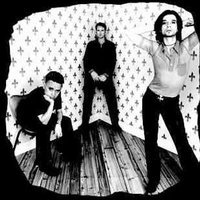Just before the Mar. 26 release of Depeche Mode's 13th studio album, "Delta Machine," South By Southwest hosted a live Q&A with the band that gave insight into their past, present and future. But it was an audience member who really zeroed in on the band's decades of success.
"I'm Jackie from Boston, and I have no question just a statement. I'm a woman of a certain age, and when friends heard I was coming to this panel, they asked me to say this. Thank you very very much for the wicked healthy sex life that you helped with when we were coming up in the '90s. A lot of people have boned to Depeche Mode."
This brought a roar of applause from the standing-room-only crowd, as did frontman Dave Gahan's corroborating statement soon after that he is basically "an overpaid stripper." But the band's conversation with KCRW music director Jason Bentley explored a wide range of non-carnal topics as well; Gahan, Martin Gore and Andy "Fletch" Fletcher discussed how they've lasted 30+ years together -- sometimes by not being together.
"We don't keep in constant contact after a tour, we only speak to each other every four to six months," said Gore, adding that they came together to finish "Delta Machine" because "the time just felt right."
The new album will also be offered in a deluxe edition featuring songs that didn't make the core track list, but Gore said Depeche Mode rarely has additional material. "It's a blessing that I'm not a prolific songwriter, so we don't usually have that problem," he said. "I think there's only one song in our career that we didn't finish." Gahan explained further, "Sometimes when you're working on things that aren't working properly, you still have to keep working on it because it will lead you to the next thing."
When Bentley described meeting Depeche Mode for the first time in 1997 when Gahan was a "hot mess," the singer opened up about his struggles with heroin addiction and what it took to get clean. "Getting better requires a lot of help, support, friends. It's slow, and you've got to want to change. If you're in a place that's not working for you... well, it wasn't working for me, but I'm glad you got a thrill out of it," he said. "In the last 15 years my life has gotten better, I participate in it in a very different way. I love the challenge of working and being a dad and husband. Sitting here and celebrating our 13th record together, that in itself... that's really what it's all about."
When asked by a reporter why the band decided to pay their first-ever visit to SXSW, Gore said, "It was suggested we do it, so we did it." Gahan added, "usually by now we'd be in a hotel room in Poland, talking to lovely journalists like yourselves and crawling up the walls. So this is nice and different."
Soon after, an audience member introduced herself as "Anna... from Poland," and asked to what the band attributes their huge popularity in Central Europe. "We actually played quite a few gigs behind the Iron Curtain when it existed," said Fletcher. "We always made the effort to play there even when we didn't get paid properly."
The final question came from an Israeli woman who lamented the trend of bands canceling tours to Israel out of fears of violence and asked how the band goes about making such decisions, as Depeche Mode did several years ago. Gahan and Gore explained that among the many reasons for that cancelation was their crew, many of whom were unwilling or able to travel to Israel during the war. "We could have flown in the day of the show, and flown out, but our crew would have had to go for three or four days," said Gore. Fletcher emphasized that after that cancelation, which was the last date on a tour, the band made a point of making Israel their first stop on the next tour and are doing so again.
Depeche Mode will play a SXSW showcase on Friday night at Austin's new Brazos Hall.





